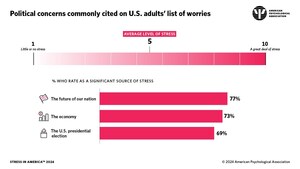Health Care System Falling Short for Stress Management, Seattle Residents Report
Stress and mental health not being addressed by health care system
WASHINGTON, Feb. 7, 2013 /PRNewswire-USNewswire/ -- Seattle residents, like Americans across the country, are finding a disconnect with what they want from their health care provider and what they actually receive, according to a new survey released today by the American Psychological Association (APA), conducted online by Harris Interactive among 2,020 U.S. adults in August 2012. In addition, 210 residents of Seattle were interviewed.
The survey shows that almost half (47 percent) of Seattle residents give their physical health care an "A" grade, higher than Americans overall (35 percent). But only 36 percent of Seattleites say the same about their mental health care. Regarding concerns about stress management, 38 percent say it is extremely or very important to have discussions about stress management with their health care provider, but only 25 percent actually discuss how to manage stress often or always.
While Seattleites have reported declining average stress levels over the past three years, their stress remains higher than they consider a healthy level of stress. Seattle residents reported stress levels of 4.7 (on a 10 point scale), 1.3 points higher than what they define as a healthy level of stress (3.4 on a 10 point scale). Survey respondents in Seattle are reporting work (65 percent), money (63 percent) and the economy (57 percent) as significant sources of stress this year. Many Seattle residents still struggle to reach stress management goals. Nearly seven in 10 (68 percent) report that managing stress is extremely or very important, but only 43 percent say they are doing an excellent or very good job at it.
"Stress can negatively affect one's overall health, and the fact that most Seattle residents are not discussing their stress with their health care provider is concerning," said Seattle-area psychologist Dr. E.B. Vance, the public education coordinator for the Washington Psychological Association. "With Seattle residents reporting higher levels of stress than what they consider healthy, it is important for people to talk to their provider about ways they can manage stress to prevent stress-related illness."
Findings from the national survey, Stress in America™: Missing the Health Care Connection, suggest that people are not receiving what they need from their health care providers to manage stress and address lifestyle and behavior changes to improve their health. The survey showed that while Americans think it is important that health care focuses on issues related to stress and living healthier lifestyles, their experiences do not seem to match up with what they value. For example, though 32 percent of Americans say it is very/extremely important to talk with their health care providers about stress management, only 17 percent report that these conversations are happening often or always.
To read the full Stress in America report or to download graphics, visit www.stressinamerica.org.
For additional information on stress, lifestyle and behaviors, visit www.apa.org/helpcenter and read APA's Mind/Body Health campaign blog www.yourmindyourbody.org. Join the conversation about stress on Twitter by following @apahelpcenter and #stressAPA.
Methodology
The Stress in America survey was conducted online within the United States by Harris Interactive on behalf of the American Psychological Association between August 3 and 31, 2012, among 2,020 adults aged 18 and older who reside in the U.S. In addition, an oversample of 210 adults living in the Seattle Metropolitan Statistical Area (MSA) was collected. MSAs are a formal definition of metropolitan areas produced by the U.S. Office of Management and Budget. These geographic areas are delineated on the basis of central urbanized areas —contiguous counties of relatively high population density. Counties containing the core urbanized area are known as the central counties of the MSA. Additional surrounding counties (known as outlying counties) can be included in the MSA if these counties have strong social and economic ties to the central counties as measured by commuting and employment. Note that some areas within these outlying counties may actually be rural in nature. This online survey is not based on a probability sample and therefore no estimates of theoretical sampling error can be calculated. To read the full methodology, including the weighting variables, visit www.stressinamerica.org
The American Psychological Association, in Washington, D.C., is the largest scientific and professional organization representing psychology in the United States and is the world's largest association of psychologists. APA's membership includes more than 137,000 researchers, educators, clinicians, consultants and students. Through its divisions in 54 subfields of psychology and affiliations with 60 state, territorial and Canadian provincial associations, APA works to advance the creation, communication and application of psychological knowledge to benefit society and improve people's lives.
Harris Interactive is one of the world's leading market research firms, leveraging research, technology, and business acumen to transform relevant insight into actionable foresight. Known widely for the Harris Poll® and for pioneering innovative research methodologies, Harris offers proprietary solutions in the areas of market and customer insight, corporate brand and reputation strategy, and marketing, advertising, public relations and communications research. Harris possesses expertise in a wide range of industries including health care, technology, public affairs, energy, telecommunications, financial services, insurance, media, retail, restaurant, and consumer package goods. Additionally, Harris has a portfolio of multi-client offerings that complement our custom solutions while maximizing our client's research investment. Serving clients in more than 196 countries and territories through our North American and European offices, Harris specializes in delivering research solutions that help us - and our clients—stay ahead of what's next. For more information, please visit www.harrisinteractive.com.
SOURCE American Psychological Association
WANT YOUR COMPANY'S NEWS FEATURED ON PRNEWSWIRE.COM?
Newsrooms &
Influencers
Digital Media
Outlets
Journalists
Opted In




Share this article